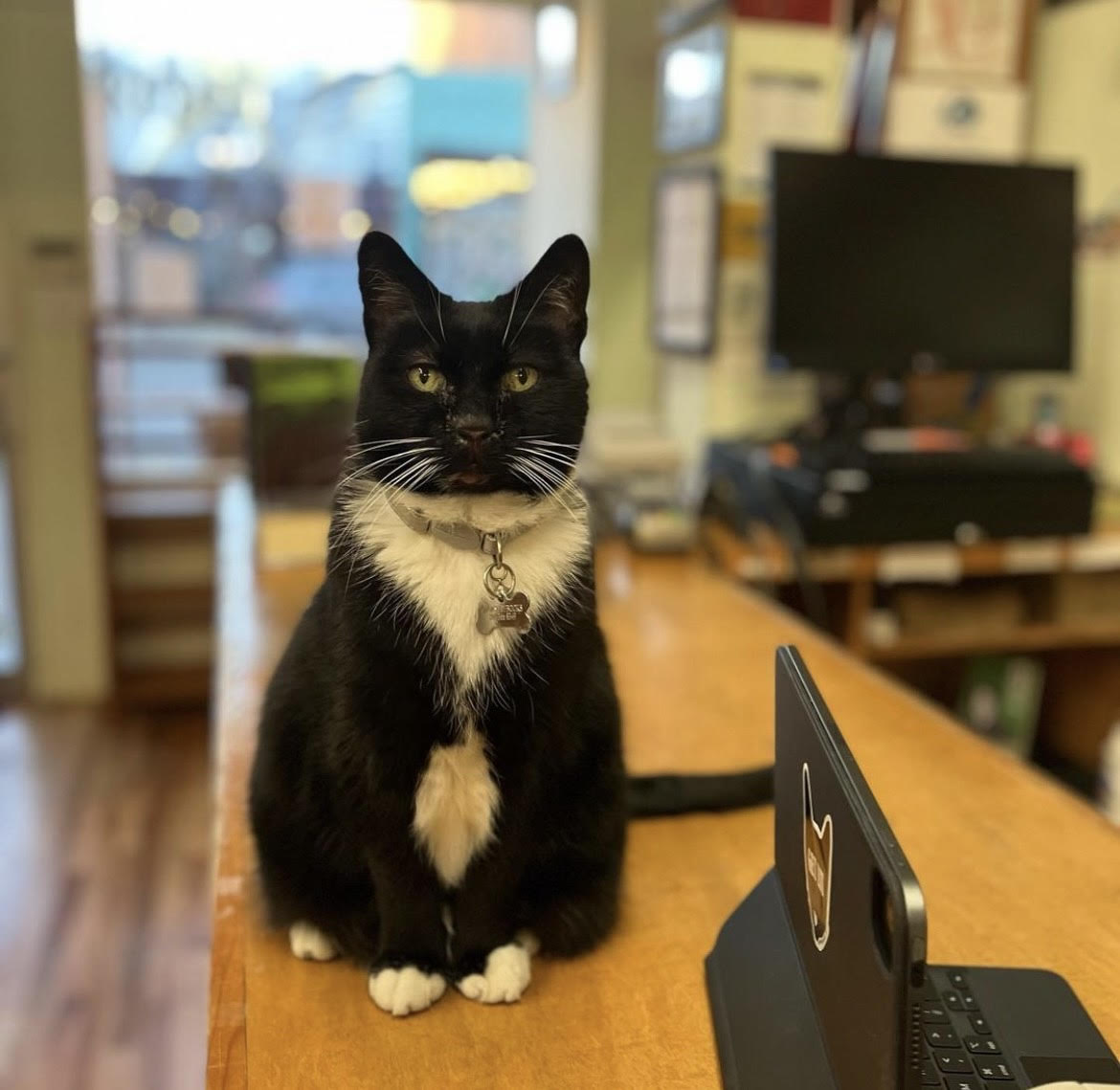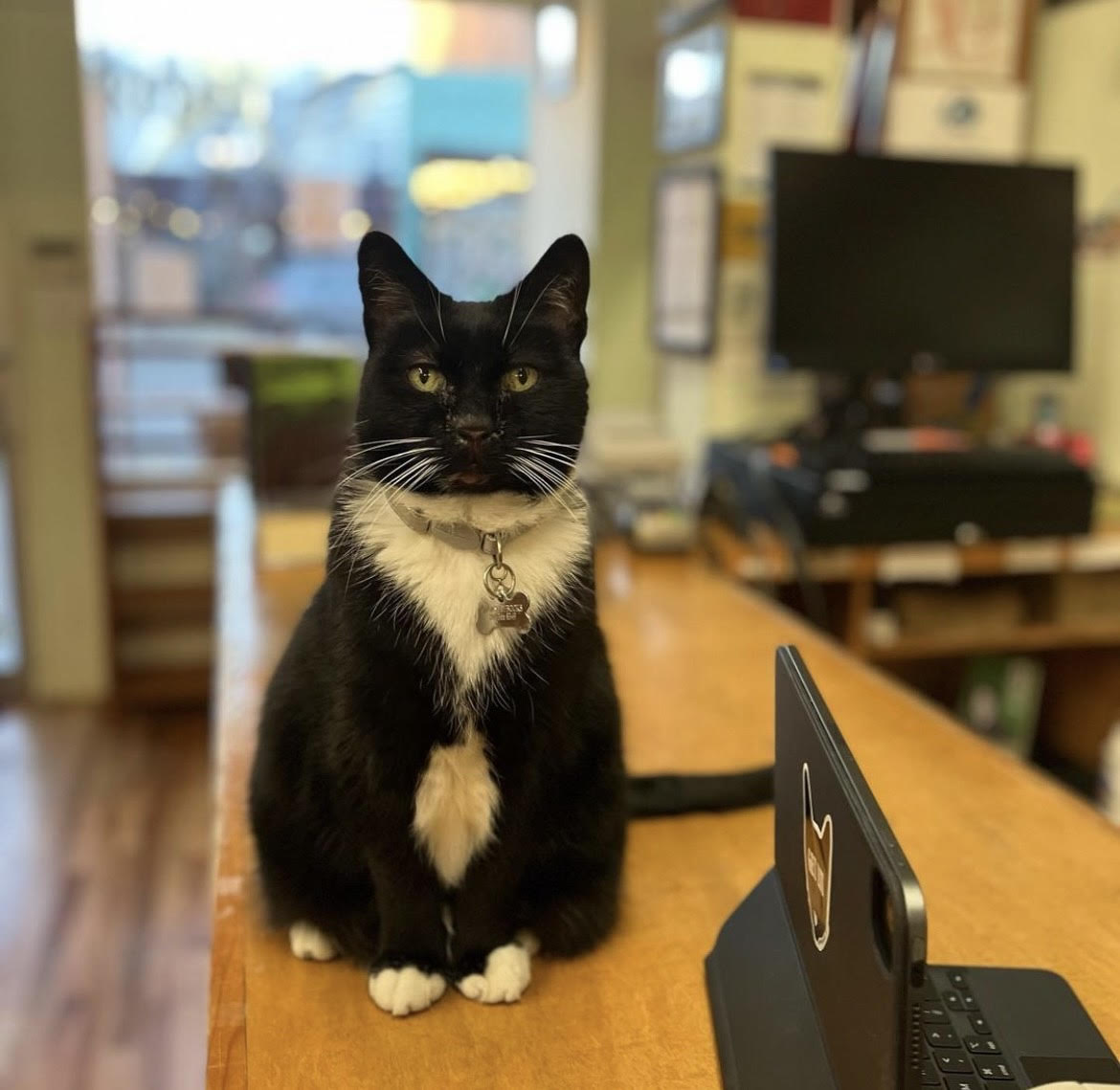
In the midst of the COVID pandemic, Beth Ann Sabo discovered TikTok.
At 63 years old, Sabo is far from the stereotypical TikTok user, striking more of a kindly grandmother figure than a member of what many perceive to be a teenage-dominated social media platform. And while she is certainly not a TikTok “influencer,” Sabo’s page boasts over 40 videos featuring Peach Street Books, the independent bookstore in Cape Charles, Virginia, that she co-owns with her sister Carol Sabo.
“It’s like the best book club meeting ever,” she says. “I just love it.”
Beyond this sentimental excitement lies a more practical edge. As a savvy businesswoman, Sabo has learned to leverage the social media site to her advantage. Now, TikTok has revolutionized the way she searches for books to stock her shelves.
She, like many indie booksellers across the country, has found innovative ways to overcome the challenges posed by the early months of the pandemic. Recent statistics reflect this unexpected success – indie book sales in the first quarter 2021 were up 75% compared to first quarter 2020. Even more surprisingly, 2021 sales were still up 60% compared to pre-pandemic sales in 2019.
It seems that despite the hardships of the pandemic, many indie bookstores have shown tremendous resilience and have even thrived since the early months of 2020. And while this has not been a universal experience for indie booksellers, it still represents a positive trend for an industry constantly facing the looming threat of Amazon.
But when the COVID-19 pandemic first hit, it was far from clear that independent bookstores like Peach Street Books were going to thrive.
Sabo remembers those early months well.
“The store itself was not open for about a month and a half,” she says. “The pandemic made us tighten our business plan.”
She and her sister adapted. They temporarily closed Peach Street Books’ cafe, revised their hours, and altered staff schedules to keep their employees safe during the peak of the pandemic.
While the store itself was closed, the Sabo sisters personally delivered books to the doorsteps of Cape Charles customers, who continued to support their local bookstore during the lockdown.
“COVID … really helped us focus,” Sabo says. “And I think other small businesses were able to do that, or at least ones that own their building.”
Indeed, the pandemic did not hit all independent bookstores equally. Indies who leased their storefronts had a particularly difficult time during the pandemic. According to the American Booksellers Association (ABA), at least 20% of indie bookstores were at risk of going out of
business in Summer 2020, a large portion of which struggled to make rent amid rapidly falling sales.
“COVID knocked me on my butt,” says Lisa Villani, owner of The Caffeinated Bookworm in Lancaster, Pennsylvania, who faced an expiring lease and high property taxes during this uncertain time. As a newly established indie with only one employee (herself), Villani felt that The Caffeinated Bookworm didn’t have the capacity to stay open. She ultimately had to partner with a third party, Building Character, who now manages her business at a new location.
“It was a charming little place,” Villani reminisced about her old store. “But I had no control over COVID. Would I have still been there? Who knows? It kind of just happened. Instead of closing up shop completely, we pivoted.”
Since the beginning of 2020, the situation has changed significantly. According to the ABA, the indie bookselling industry nearly completely recovered by the end of 2020.
“It came down to a couple of things in the last quarter,” says ABA CEO Allison Hill. “One was PPP money from the government (the Paycheck Protection Program was established by the U.S. federal government in 2020 to financially support small businesses during the pandemic). It made a huge difference for stores because that gave them an influx of cash to help bridge them through the crisis. And then the other thing was a complete resurgence of local support. People really rallied around the holiday season for the fourth quarter.”
While this trend is certainly tied to wide-scale factors like government loans and local support for small businesses, the adaptability of indie bookstore owners is also a key part of this surprising success story.
For Sabo, downloading TikTok was a profitable way to adapt to uncertain times. It began when she noticed an unprecedented number of customers in her store requesting a young adult novel called It Ends With Us by Colleen Hoover.
“It’s not my sort of title,” Sabo admits. “But man, I couldn’t keep it on the shelf. And when someone finally told me, ‘I saw that on BookTok,’ (a subcommunity on TikTok) I was like ‘I gotta check this out!’”
Since then, Sabo has used the TikTok algorithm to her advantage – by regularly scrolling through the platform, she gauges which titles are currently most popular in each genre and curates her shelves accordingly. This allows her to quickly stay up-to-date on the latest reading trends, even in genres she isn’t personally familiar with.
BookTok also may play a role in the demand side of the equation; indie bookstores are noticing a surprising influx of new customers inspired to read by TikTok.
“BookTok drives so much business to indie bookstores,” affirms Sabo. “It drives a lot. I’ve had people come into the store and not want to look at any book unless they saw it on social media.”
Fig Salmoran from Chop Suey Books in Richmond, Virginia, has noticed this in their store as well. “I do see people coming in to buy books that are trending on BookTok, and often recommending them to each other in the store,” they say. “There’s so much joy in connecting with people over shared content you've all consumed; it’s like being in an online book club.”
This trend is not isolated to the indie bookselling community – bookstores of all types have been enjoying a recent uptick in sales during what the ABA has coined a “Renaissance of Reading.”
“BookTok has been great for a lot of different bookstores. Social media, especially BookTok, has brought a lot of people back into bookstores,” confirms Olivia Sears, assistant manager at the Book Warehouse in Williamsburg, Virginia.
By providing indies with a way to gauge the market, and by driving new customers to local bookstores, TikTok has proven to be an unexpected asset for indie bookstore owners.
Similarly, a new e-commerce platform called Bookshop.org has been an invaluable tool for indie bookstores since the start of the pandemic.
Bookshop.org is an online bookstore with a mission to support independent bookstores – by design, the corporation gives away over 70% of its profit margin to the indie community.
Independent bookstores that are members of the ABA can open a free Bookshop page, which they customize to include bios, pictures, and recommended reading lists. Indies receive the full profit margin (30% of the cover price) of any sales made through their page without having to handle inventory, shipping and handling, or customer service complaints.
Bookshop.org launched in January 2020 with the support of the ABA, a mere two months before the start of the pandemic, with the goal of providing socially-conscious online customers with an alternative to Amazon. According to Sarah High, Senior Partnerships Manager at Bookshop, 88 indies were registered with Bookshop.org when it launched. This number spiked to 365 in March 2020 and steadily climbed to reach 1,300 (out of 1,600 total registered ABA stores) by November 2021.
“From these numbers, you can tell how needed an easy e-commerce platform was for booksellers because of the pandemic,” says High. “I was onboarding tons of stores everyday in March when the pandemic hit.”
For many indie bookstores, Bookshop.org provided an essential way to generate revenue even when physical stores were closed or customers were quarantined due to the pandemic. “Bookshop was vital to their survival,” explains High. “Especially during lockdown, they were able to make rent and pay their employees. Stores couldn’t sell books at all if they weren’t on Bookshop because a lot of them didn’t have a robust e-commerce platform.”
Villani had tried to establish an online presence in the past, but “trying to do our inventory and hook it up to the website is such a monumental task,” she explains. “I like having Bookshop do my online order, because then people who want a book get it right into their hands.”
During the month of May 2020, Villani’s store was closed as she transitioned from her old location to Building Character, a shopping complex managed by a third party in Lancaster, Pennsylvania. “But I had already hooked up with Bookshop.org,” she says. “If people were looking for something I sent them that way so that I was still generating sales.”
Even when their physical locations are open, many indies have continued to use Bookshop.org as a way to supplement their profits and cater to the constantly growing number of online shoppers. “Bookshop is a great system because it allows us to easily sell new books to people who want them shipped,” confirms Salmoran. “It allows us to receive support from people who may not be local or able to shop in-store.”
According to High, these customers are Bookshop’s target market. “Bookshop is not really designed for an indie bookstore goer,” she explains. “Those customers should continue shopping at their indies. Bookshop is definitely designed for those customers who are shopping online for their books.”
This statement reflects Bookshop’s mission of drawing online customers away from Amazon. However, some have expressed concern that customers are forming a habit of shopping online, which could potentially harm sales for indies.
“There were points in the pandemic where people were doing 80-100% of their shopping online if they (indies) were closed due to COVID,” says Hill, “and now we’re seeing about 75% have returned to the stores, which is great, but they’re also shopping way more online because they’ve developed new habits.”
Both High and Hill agree that the hard-core indie shoppers will continue to visit their local bookstores in-person. The unpredictable consumer groups are those who typically shop online at Amazon or Barnes & Noble, as well as those who began shopping online during the pandemic.
“It depends on who you talk to,” says Hill. “You’ll definitely find there are people who don’t believe in it (Bookshop) at all. And then you have people who say, ‘It saved my store, I wouldn’t have survived the pandemic without it.’And then you have people in between who are just trying to think innovatively about ‘there’s this disruption, this opportunity. How do I make it work for me?’And that’s what I’m seeing the most of now.”
Villani, Salmoran, and Sabo certainly fit into this last category – all have chosen to do what they’ve done throughout the pandemic and adapt to a rapidly changing world.
Sabo, for example, anticipates that Bookshop will gain more momentum in the future and hopes to make it a central part of her business strategy going forward. “It’s something I know I should be using more,” she says, “because I could probably drive a lot more business there.”
Despite constant worrying about the traditional danger of Amazon and the newer threat of the pandemic, most in the indie community are surprisingly optimistic about the prospects of indie booksellers. Hill and High partially attribute this optimism to the characteristics of indie bookstore owners.
“What I love about booksellers,” says High, “is that they’re very stubborn and independently minded.”
“The thing about independent bookstores is that they're very independent,” adds Hill. “The joke is, if you ask nine booksellers their opinion, you'll get 10 opinions.”
Sabo has a different opinion,
“People who love indie bookstores just love them. Indie bookstores are never going away because people love them, and they just love books!”
“By the way,” she says with a grin, “business is booming.”















